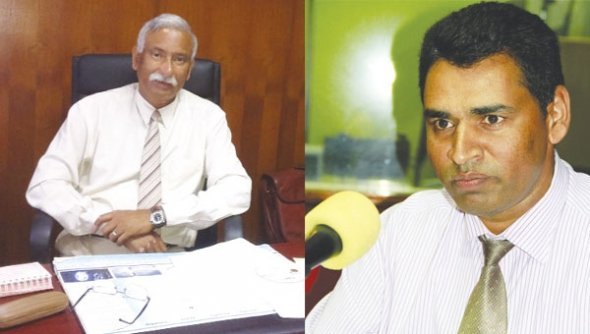Penalty Points, Ben Buntipilly: "Offenders Will Pay Dearly for their Irresponsibility"

"That's when their license will be revoked they really become aware of the situation," Ben Buntipilly advance, advise on road safety in the "Grand Journal" hosted by Dinesh Siharry. He had with him the inspector Rama the Traffic Branch.
> Are you satisfied with your contribution as a special adviser to Prime Minister on road safety?
Ben Buntipilly: In just three years, I can not reverse a trend that lasts for years. It is true that I was in the police force, particularly in the Traffic Branch, but I did not have the same opportunities I did not say the same power. What I did during the last three years, it would be long to develop, but let me tell you that I am satisfied with my contribution.
Of course, we still regret the deaths on our roads, but we can not, overnight, see the desired results. When you plant a fruit tree, it must be watered and provide care before tasting fruit. I repeat, I am satisfied and the Prime Minister is also the work. However, we are less results we have. We will continue the work. Give us a little time, we have plans must be seen in a holistic approach.
> Tell us about your role as advisor on road safety?
Ben Buntipilly: My role is to advise the Government, through the Prime Minister, road safety to prevent the dangers of the road. But, as we know, zero tolerance is quite difficult. I have no powers other than to advise.
> Would you have liked to have other?
Ben Buntipilly: If I had other powers, I think we could have done better ...
> Tell us about the cooperation between the cell you occupy the Prime Minister's Office and the police?
Ben Buntipilly: We work closely with all stakeholders, the Department of Public Infrastructure, the Road Development Unit and the police force. But I must say, it was not too easy in the beginning. It is human. But now we work as a team and together.
> What is your feeling when you look at the number of deaths on our roads during the first months of this year compared to 2012?
Inspector Rama: The number of deaths as well as injuries on our roads challenge us all - the police as members of the public. The police and the cell responsible for road safety Office of the Prime Minister work closely. We often consultations. We make recommendations and we study all the problems in their entirety.
First, we lay great emphasis on education. This is why we have several working sessions with civil society, including students from primary to tertiary, groups of senior citizens, professional drivers. For example, our outreach program has reached more than 60,000 people in 2012. January of this year so far, we have raised awareness about 40 000 people ...
> But it is clear that despite these campaigns, the road continues to the dead ...
Inspector Rama: I 'would have asked the question in another way. If there were not these campaigns, how many more lives would we have on our roads? What I mean is that with the resources we have, we do our best to provide more safety on our roads. In principle, awareness gives results in the long term. In the short term, we apply the law in all its rigor.
I'm surprised if I tell you that last year, police issued more than 210,000 tickets. So we are always on the ground. All our operations are "intelligence led operations." That is to say that there is a cell planning and a cell intelligence. We collect information that we analyze before boarding operations. For example, we observed that there are many fatal 18 hours between midnight and accidents. We investigate the causes of such accidents and take the appropriate action.
> With all the training of the police force, is it really necessary to bring a Belgian trainer to give our driver training courses?
Ben Buntipilly: Very good question. We did not expect the accident to the authorities Sorèze through the Mauritius Institute of Training & Development (MITD), do bring a foreign trainer. We did not expect there to be this accident to make a barrel or car come to bring a doctor to work on medical tests. It was in the program. It is very important to know that learning to drive and why learning to drive. Are we learning to drive to rallies, to do his job or to travel?
You should know where you learn to drive. The Prime Minister has said, repeatedly, that's driving our drivers lacking. He even said that only 15 to 20% have a good driving. So this is the basic training. It should be understood that no critical driving schools. One way or another, they have helped to form our drivers. But it is time to innovate, review the examination process for a driver's license. It is time to review the training.
> The prime minister personally marketing of penalty points. For him, there was no turning back. Much has been talked about in the media. Do not you feel that the message is not passed?
Inspector Rama: I think it is too early to make an assessment. The concept of penalty points is to improve driver behavior behind the wheel. This does not happen overnight.
Ben Buntipilly: To date, a thousand drivers were affected by the penalty points. Some have paid fines. As you said, drivers continue to use their phones while driving, other driving under the influence of alcohol. This is when they have 15 points and their license may be revoked, they really become aware of the seriousness of the situation. They pay their expensive irresponsibility.


